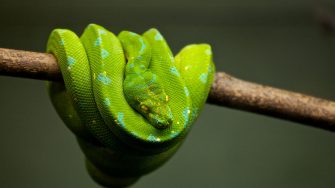
Overview
The UNSW Evolution (BIOS3171) course studies evolutionary ideas and research techniques to improve your scientific skills. You'll learn how to generate research questions, analyse and interpret data, and write a scientific paper. Evolutionary biology asks how organisms change over generations, diversity, and adapt to their environments. Evolutionary principles are central to understanding biological diversity, organismal structure and function, and the structure of ecological communities.
Course breakdown
The course includes a compulsory field trip to Smiths Lake Field Station, where students carry out independent research projects.
The course includes weekly three-hour tutorials where students learn foundational concepts and topics, including:
- how populations adapt to changing environments
- how biological diversity arises
- evolutionary genetics and genomics
- developmental plasticity
- why organisms reproduce sexually/asexually
- how females and males coevolve
- evolutionary conflict and cooperation between and within species
- phylogenetic analysis
- why we age
- how species arise and diversity
- human evolution
- applications of evolutionary biology.
Conditions for enrolment
It is recommended for students to study Evolutionary and Physiological Ecology (BIOS2011) prior to taking BIOS3171. BIOS2011 was pre-requisite for BIOS3171 in 2020 and in prior years. BIOS2011 would be assumed knowledge for BIOS3171 from 2021.
Career opportunities
Evolutionary biology is central to our understanding of how organisms function, adapt and survive. All areas of biological research, from fundamental questions about biological diversity, function and ecology to applied questions in medicine and agriculture, involve evolutionary principles.
An understanding of evolutionary principles is also essential for many other professions, including science teaching, and wildlife conservation and management. At UNSW Science, you can become an expert in this field by specialising in the majors: biology or ecology.
What our graduates say
”What made Evolution (BIOS3171) so valuable was that it taught me how to think like an evolutionary biologist. It covered topics such as heredity, genetics, adaptation, life-history, sexual selection, sexual conflict, co-evolution, and speciation. It gave me the tools and vocabulary to think about how evolution works, to know which questions to ask, and which methods best fit answering those questions. BIOS3171 also gave us students plenty of opportunities to put our evolutionary thinking into practice: we devised hypotheses about how evolution works in the real world, and designed experiments that aimed to test those hypotheses.”
- Nathan William Burke, UNSW Science graduate.
